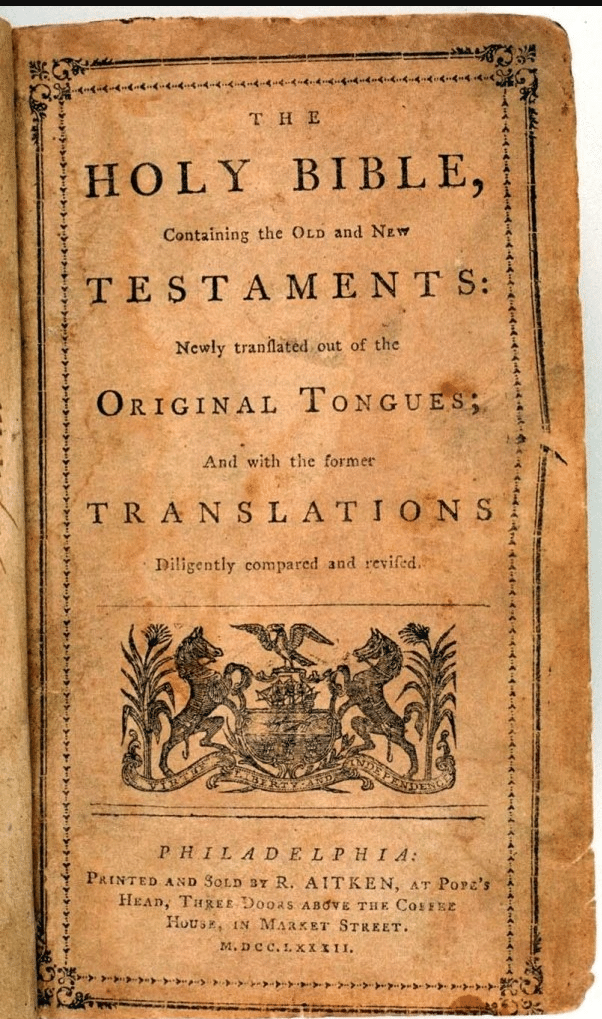Many citizens of Tennessee were undoubtedly surprised when in 2024, the legislature adopted and the governor signed a law making the Aitken Bible one of 10 official books of the state.
This adoption followed a movement some years earlier to designate the Bible as the only such volume. Although the state legislature adopted this bill, the governor at the time, Rep. Bill Haslam, vetoed it, thinking that government endorsement would trivialize the Good Book.
Supporters of the more recent bill likely thought that there would be fewer conflicts with the First Amendment if the Bible were one among many such volumes (much like the so-called “reindeer rule” that permits a manger scene on public property when surrounded by secular religious symbols) rather than standing alone.
For those who are interested, the other nine volumes adopted in 2024 are: George Washington’s “Farewell Address,” which is not a book and was written before Tennessee became a state; Alexis de Tocqueville’s “Democracy in America”; the “Papers of Andrew Jackson” which actually consist of multiple volumes; Alex Haley’s “Roots”; James Agee’s “A Death in the Family”; Robert Penn Warren’s “All the Kings Men”; Jon Meacham’s “American Lion”; Shelby Foote’s “The Civil War: A Narrative”; and Dolly Parton’s “Coat of Many Colors.”
History of the Aitken Bible
The Aitken Bible has increasingly become associated with attempts to challenge the idea of the separation of church and state. It is a printing of the Bible that, like Washington’s “Farewell Address,” preceded Tennessee’s entry into the Union.
The Bible, a King James Version, was printed in 1792 by Robert Aitken (1734-1802) of Philadelphia, who had previously printed a copy of the New Testament. Aitken printed the full Bible at a time when the Revolutionary War had cut off trade with Britain, which had previously manufactured most Bibles used in the colonies. After the war, Britain had prevented the importation of Bibles that Congress had ordered from Holland and Scotland. Although American printers had previously printed both a Bible for Native Americans and one for German speakers, Aitken’s was the first full Bible printed in English in America.
Aitken tried unsuccessfully to get Congress to fund bible printing
On Jan. 21, 1781, Aitken appealed to Congress as follows:
That in every well regulated Government in Christendom The Sacred Books of the Old and New Testament, commonly called the Holy Bible, are printed and published under the Authority of the Sovereign Powers, in order to prevent the fatal confusion that would arise, and the alarming Injuries the Christian Faith might suffer from the spurious and erroneous Editions of Divine Revolution. That your Memorialist has no doubt but this work is an Object worthy the attention of the Congress of the United States of America, who will not neglect spiritual security, while they are virtuously contending for temporary blessings (Pears 1939, 229).
Contrary to Aitken’s wishes, Congress neither appropriated money to help fund this project nor offered to purchase copies. After a committee reviewed the manuscript, however, Congress did issue an endorsement on Sept. 10, 1782:
Whereupon, Resolved, That the United States in Congress assembled highly approve the pious and laudable undertaking of Mr. Aitken, as subservient to the interest of religion, as well as an instance of the progress of arts in this country, and being satisfied from the above report of his care and accuracy in the execution of the work, they recommend this edition of the Bible to the inhabitants of the United States, and hereby authorize him to publish this Recommendation in the manner he shall think proper (Pears 1939, 234).
After the establishment of the new Constitution, Aitken asked that Congress give him the exclusive rights to publish the Bible for the next 14 years, but it did not do so. Moreover, cheaper Bibles were once again being imported, and it does not appear that Aitken ever recovered the investment he had made.
Aitken Bible is rallying point for Christian nationalists, others
In recent years, the Aitken Bible has become a rallying point for Christian nationalists and others who do not believe that the First Amendment, which was adopted years after Congress lent its endorsement to the Aitken Bible, calls for separation of church and state. They view the congressional endorsement of the Aitken Bible as an historical example that proves their point. Angela Latham of The Tennessean reports that Claiborne County Republicans showcased this Bible at their 2024 Freedom Dinner as “a solution by patriots for patriots.”
Such groups have presented copies of the Aitken Bible to prominent politicians in Tennessee and elsewhere. Florida Gov. Ron DeSantis took his oath of office on one of the few remaining original copies of this Bible, and Supreme Court Justice Clarence Thomas apparently displays one on his office desk (Latham 2024).
It seems somewhat ironic that Congress would endorse a Bible version named after a British king (King James) who commissioned it and who suppressed both Catholics and dissenters from the Church of England, some of whom fled to America. Aitken had his own prejudices. When approached about printing a Catholic version of the Bible, Aitken is quoted as saying “that he would rather print the woman of pleasure, than such a pestiferous, idolatrous book” (quoted in Carter 2007, 453-454).
The Jefferson Bible
The only book Bible that Congress appears to have printed through the Government Printing Office is The Jefferson Bible, originally titled “The Life and Morals of Jesus of Nazareth,” which it printed for its members from 1905 to the early 1950s. Consistent with Jefferson’s own rationalism, his highly edited copy of the four gospels in Greek, Latin, French, and English omits all of the miracles recorded there.
It does not appear that any states have adopted The Jefferson Bible as their official books.
John R. Vile is a political science professor and dean of the Honors College at Middle Tennessee State University. He is author of "The Bible in American Law and Politics: A Reference Guide."

